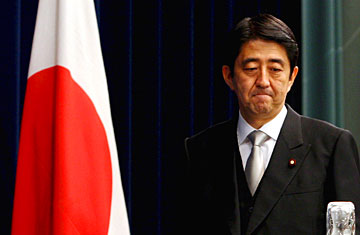
Prime Minister Shinzo Abe gives a speech at his official residence, Aug. 27, 2007. On Sept. 12, Japanese media reported he would step down
It was less than a year ago that a newly elected Prime Minister Shinzo Abe — the son of a Foreign Minister and the grandson of a Prime Minister — opened the Japanese legislature, the Diet, with an ambitious call to remake the country's postwar system, to create what he termed "a beautiful Japan." His vision was of an influential and energetic Japan, one that would not be bound by the pacifism that he believed had been forced on the Japanese in the wake of World War II, a nation whose presence on the geopolitical stage would finally match its economic muscle.
Today that ambition has turned to ashes, Abe is poised to make a humiliating exit from power, and, as a result, Japanese politics has been thrown into disarray. Less than two days after delivering a policy speech to open the new Diet, Abe abruptly announced that he would resign. At a press conference, an emotional Abe acknowledged that he had lost public support, and that a different leader might be able to carry Japan out of the political quagmire his deep unpopularity had created. "I've decided to create a new situation by resigning," the 52-year-old Abe told a national TV audience. Abe's ruling Liberal Democratic Party (LDP) — which has a solid majority in the Diet's Lower House and therefore controls the government — announced that it would hold leadership elections on Sept. 19 to choose the country's next Prime Minister. The top candidate is LDP Secretary-General and former Foreign Minister Taro Aso, who emerged as the most influential member of Abe's cabinet.
Japan had been anticipating Abe's resignation since he led the LDP to an historic loss in legislative elections at the end of July, which left the opposition Democratic Party of Japan (DPJ) in control of the Diet's Upper House for the first time in the country's history. His popularity had plummeted from a high of near 70% when he took power last September to below 30% in recent polls, after many his scandal-ridden aides began resigning. "The true nature of the LDP — a dying body on life support — has been exposed," says Japanese political analyst Hirotada Asakawa.
But the timing of Abe's departure was a shock in a nation where politics are usually as predictable as the train schedules. At the Asia Pacific Economic Cooperation summit in Sydney on Sept. 9, Abe told reporters that he was wagering his job on his ability to pass controversial legislation that would renew Japanese naval support for U.S. and coalition forces operating in Afghanistan. The deadline for the Afghanistan bill's passage is Nov. 1, and the opposition DPJ had declared its intention to block the law, setting up a direct face-off with the LDP — one that Abe, who liked to tout himself as a "fighting politician," apparently had no stomach for. Abe's advisers put out the word that the Prime Minister's health had been suffering — though they offered no details — but Abe's surrender just three days into a new Diet sessions seemed less compromise than a failure of political nerve. "In my almost 40 years in politics, it's the first time I've seen this," said Ichiro Ozawa, the leader of the DPJ.
The biggest loser is likely to be the LDP itself, the party that has dominated Japan for nearly the entire postwar era. Though it holds, along with coalition partners, a two-thirds majority in the Diet's Lower House, and new elections aren't scheduled until Sept. 2009, sagging public support means that the next Prime Minister will almost certainly be forced to call early polls. Barring a new leader who can engineer a miracle turnaround — something none of the well-worn LDP candidates seem capable of — the party could well be tossed out of government altogether. "Abe has thrown the LDP into a desperate state from which it will never recover," wrote Glenn Maguire, Asia Pacific Chief Economist at Societe Generale in Hong Kong, in a report today.
More broadly, Abe's resignation spells the end of an attempt among more conservative members of the LDP to loosen the bounds of postwar pacifism and forge a true military alliance with the U.S. That change gathered momentum under Abe's popular predecessor, Junichiro Koizumi, who committed Japanese forces to assisting the U.S. in anti-terror operations — including in Iraq — and made noises about revising Japan's constitutional restrictions on military activity. (Japanese troops are allowed to act only in self-defense.) When he came to power, Abe made constitutional revision one of his top priorities, and kept the U.S. alliance as the keystone of his foreign policy.
But the aging Japanese public was more worried about the state of its economy and failing pension system than the war on terror, which was never popular in Japan, and concerns grew that the country had become too close to the U.S. Abe never adjusted his priorities, and he paid the price at the polls. Though he said that the LDP would still fight to renew the Afghanistan bill, insiders have suggested the party may withdraw the bill in the face of opposition from the DPJ and the public. If that happens, Japan will likely return to the arm's-length relationship it had with America for most of the Cold War, and the country, consumed by domestic fears, could turn inward. In the end, Abe's "beautiful Japan" may turn out to be the old Japan.
